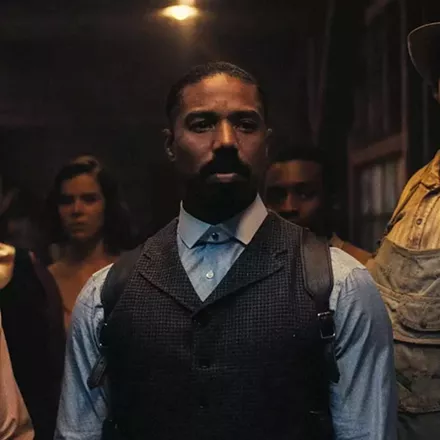No Lecture Required
Ma Rainey's Black Bottom turns hot-button catch-phrases into searing human drama
By Scott Renshaw @scottrenshawThere are things stories can impart that ideological lectures and history lessons generally can't. No matter how righteous the idea, attaching it to a narrative gives it an emotional force that it can otherwise lack. That's why a huge chunk of the country found itself startled to learn for the first time about the 1921 "Black Wall Street" Tulsa race massacre when it was incorporated into the background of HBO's 2019 Watchmen miniseries—and awakened to the notion that our national mythology about bootstraps economics doesn't take into account how often people have the boots stolen from their feet before they can pull up any straps.
August Wilson's 1984 play Ma Rainey's Black Bottom touches on ideas that have been reduced to simplistic catch-phrases like "grievance mentality," "institutional racism" or "cultural appropriation" in the national conversation, and sloppy dramatists would lean into pedantry to make their point. Here instead is a tale that centers the way those issues impact actual people, and does so in a way that allows flawed, angry characters their humanity.
Set primarily in 1927 Chicago, it focuses on the real-life figure of pioneering American blues singer Ma Rainey (Viola Davis). At a local recording studio, Ma's back-up musicians—trumpeter Levee (Chadwick Boseman), trombonist Cutler (Colman Domingo), pianist Toledo (Glynn Turman) and bassist Slow Drag (Michael Potts)—await the arrival of Ma, with tensions beginning to emerge over Levee's ambitious plans for his own career as a musician. And when Ma does finally arrive, those tensions continue as her demands lead to delays and conflict with the studio's producer (Jonny Coyne) that need to be smoothed over by Ma's manager (Jeremy Shamos).
The early scenes play loose with the banter and uneasy chemistry between the band members, allowing Boseman to shine as the burr under everyone's saddle. Much will be made, understandably, of the fact that this was Boseman's last screen performance before his tragic passing earlier this year, and the prospects for a posthumous Oscar. And it's an electrifying performance, alternately cocky and vulnerable as we get a glimpse into the soul of a man whose apparent grinning willingness to work within the system to get what he wants hides a roiling rage at sensing he'll never get what he feels he deserves as an artist, or as a man, because of his race.
Wilson's text—adapted by Ruben Santiago-Hudson, who worked with director George C. Wolfe on the 2005 adaptation of Santiago-Hudson's play Lackawanna Blues—digs into the stories behind his characters' personalities in a way that lays bare the issues he's addressing, yet without every making them seem like "issues." Boseman's monologue relating a childhood trauma that shaped Levee's worldview is searing in its exploration not just of the way Black Americans who played by the rules for getting ahead still ended up with nothing, but of the horrifying life for Black Americans in the South that led to the Great Migration. Meanwhile, what initially looks like inexcusable diva behavior by Ma reveals itself to be her own recognition that she might as well make white people jump as long as she knows she is of economic value to them. In a scant 94 minutes, Ma Rainey's Black Bottom provides a stunningly concise portrait of Black America's relationship with capitalism: the few ways in which they can manipulate it, and the many ways in which it always seems to cheat them.
The text might actually have too many things on its mind to explore them all fully, most notably the relationship between Ma and her female lover Dussie Mae (Taylour Paige), and how maintaining some kind of economic power provides the only chance for such a relationship to exist in that time. Wolfe—a stage veteran and Tony Award-winner for the original Broadway production of Angels in America—hits all these topics while juggling his characters and his few locations in a way that absolutely gives this the feel of a movie rather than a filmed play. Indeed, one of Ma Rainey's key moments involves the way Wolfe reveals what is behind a door that Levee has been banging on, convinced that there's something important on the other side. What he finds tells us more than any well-intentioned lecture ever could.
More by Scott Renshaw
-
Film Reviews: New Releases for April 18
Sinners, The Wedding Banquet, Sneaks, The Ugly Stepsister, One to One: John & Yoko
- Apr 17, 2025
-
Film reviews: ONE TO ONE: JOHN & YOKO, THE WEDDING BANQUET, THE UGLY STEPSISTER
Three new movies offer fresh takes on familiar stories.
- Apr 16, 2025
-
Comedian Steve Hofstetter interview
Veteran standup talks about getting started, dealing with hecklers, and learning a valuable lesson in SLC
- Apr 11, 2025
- More »
Latest in Film Reviews
Readers also liked…
-
Sundance 2025 wrap-up plus February special screenings
Uncertainty about the future location shifts focus away from the movies
- Feb 5, 2025






